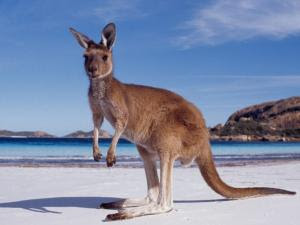REPORT TEXT
Report Text adalah salah satu dari ke-13 jenis teks bahasa Inggris (genre)
yang menghadirkan informasi tentang sesuatu seperti alam, hewan,
tumbuhan, hasil karya manusia, dan fenomena sosial dengan apa adanya.
Informasi yang dihadirkan dalam Report Text adalah hasil dari observasi dan analisis secara sistematis. exampels:
1.Batik

A kangaroo is an animal found only in Australia, although it has a smaller relative, called a wallaby, which lives on the Australian island of Tasmania and also in New Guinea.
Kangaroos eat grass and plants. They
have short front legs, but very long, and very strong back legs and a
tail. These are used for sitting up and for jumping. Kangaroos have been
known to make forward jumps of over eight metres, and leap across
fences more than three metres high. They can also run at speeds of over
45 kilometres per hour.
The largest kangaroos are the Great Grey Kangaroo and the Red Kangaroo. Adult grow to a length of 1.60 metres and weigh over 90 kilos.
Kangaroos are marsupials. This means that the female kangaroo has an external pouch on the front of her body. A baby kangaroo is very tiny when it is born, and it crawls at once into this pouch where it spends its first five months of life
1.Batik
Indonesia
has many traditional fabrics, one of them is batik. Batik is originally
coming from Indonesia. Every region which has batik has own
characteristic.
Batik
divided into two kinds. Batik cap, batik which made by printed design
using special modern tools. The second one is batik tulis which made by
drawing the design using a tool named canting manually directly on the
fabric without any modern tools.
The
price of batik is also different. Usually batik this has more
expensive price than batik cap because of the difficulty in producing
it. Making batik tulis is more complicated. We have to make it
carefully and it needs longer time than producing batik cap. Batik cap
just prints the design with the tools. After that the both have the
some processes.
Batik
has different characteristic in each region. For instance, batik
Pekalongan has differences with batik from Kalimantan, Solo, and others
although it just differ in shape of lines. Usually it describes or
symbolizes its region.
Now
days, batik is not an ancient thing to wear. Batik become popular in
fashion with modern touch. And Indonesia needs to be proud of batik
because batik is confessed as a cultural heritage of the world by
UNESCO.
2.Kangaroo

A kangaroo is an animal found only in Australia, although it has a smaller relative, called a wallaby, which lives on the Australian island of Tasmania and also in New Guinea.
The largest kangaroos are the Great Grey Kangaroo and the Red Kangaroo. Adult grow to a length of 1.60 metres and weigh over 90 kilos.
Kangaroos are marsupials. This means that the female kangaroo has an external pouch on the front of her body. A baby kangaroo is very tiny when it is born, and it crawls at once into this pouch where it spends its first five months of life
3 . Borobudur temple
Borobudur Temple is a 9th-century Mahayana Buddhist monument near Magelang, Central Java, Indonesia. The monument comprises six square platforms topped by three circular platforms, and is decorated with 2,672 relief panels and 504 Buddha statues. A main dome, located at the center of the top platform, is surrounded by 72 Buddha statues seated inside perforated stupa.'
Borobudur has since been preserved through several restorations. The largest restoration project was undertaken between 1975 and 1982 by the Indonesian government and UNESCO, following which the monument was listed as a UNESCO World Heritage Site. Borobudur is still used for pilgrimage; once a year Buddhists in Indonesia celebrate Vesak at the monument, and Borobudur is Indonesia's single most visited tourist attraction
 |
| Borobudur Temple |
Borobudur Temple is a 9th-century Mahayana Buddhist monument near Magelang, Central Java, Indonesia. The monument comprises six square platforms topped by three circular platforms, and is decorated with 2,672 relief panels and 504 Buddha statues. A main dome, located at the center of the top platform, is surrounded by 72 Buddha statues seated inside perforated stupa.'
The monument is both a shrine to
the Lord Buddha and a place for Buddhist pilgrimage. The journey for
pilgrims begins at the base of the monument and follows a path
circumambulating the monument while ascending to the top through the
three levels of Buddhist cosmology, namely Kāmadhātu (the world of
desire), Rupadhatu (the world of forms) and Arupadhatu (the world of
formlessness). During the journey the monument guides the pilgrims
through a system of stairways and corridors with 1,460 narrative relief
panels on the wall and the balustrades.
Evidence suggests Borobudur was
abandoned following the 14th-century decline of Buddhist and Hindu
kingdoms in Java, and the Javanese conversion to Islam. Worldwide
knowledge of its existence was sparked in 1814 by Sir Thomas Stamford
Raffles, then the British ruler of Java, who was advised of its location
by native Indonesians.
Borobudur has since been preserved through several restorations. The largest restoration project was undertaken between 1975 and 1982 by the Indonesian government and UNESCO, following which the monument was listed as a UNESCO World Heritage Site. Borobudur is still used for pilgrimage; once a year Buddhists in Indonesia celebrate Vesak at the monument, and Borobudur is Indonesia's single most visited tourist attraction



Comments
Post a Comment